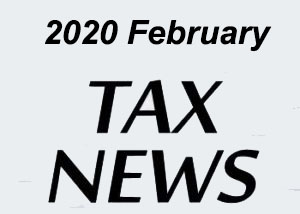MONTHLY TAX UPDATE – FEBRUARY 2020
-
Taxable payments reporting for businesses hiring cleaning or courier contractors
Over the summer holidays season some businesses use more cleaning and courier contractors, and therefore may need to lodge a Taxable payments annual report (TPAR) in August 2020.
At this time of year we see some types of businesses making increased contractor payments to cleaning and courier services, especially:
- event management and building maintenance, property management businesses engaging contractors to provide cleaning services
- florists and other retail businesses engaging contractors to provide courier services.
In these circumstances, your business will need to report if they:
- have an Australian business number (ABN)
- pay contractors to provide courier or cleaning services on their behalf
- provide cleaning or courier services, and the payments they receive for these services make up 10% or more of their total GST turnover, even if their business is not registered for GST.
If you’re not sure whether your business needs to complete a TPAR, check our website or talk to your tax professional.
-
Taxable payments annual report (TPAR)
You may need to lodge a Taxable payments annual report (TPAR) by 28 August each year if you are a:
- business providing
- building and construction services
- cleaning services for contractor payments from 1 July 2018 (first report due by 28 August 2019)
- courier services for contractor payments from 1 July 2018 (first report due by 28 August 2019)
- road freight services for contractor payments from 1 July 2019 (first report due by 28 August 2020)
- information technology (IT) services for contractor payments from 1 July 2019 (first report due by 28 August 2020)
- security, investigation or surveillance services for contractor payments from 1 July 2019 (first report due by 28 August 2020)
- mixed services (a business that provides one or more of the services listed above)
- government entity.
The TPAR tells us about payments that are made to contractors for providing services. Some government entities also need to report the grants they have paid in a TPAR.
Contractors can include subcontractors, consultants and independent contractors. They can be operating as sole traders (individuals), companies, partnerships or trusts.
The details you need to report about each contractor are generally found on the invoice you should have received from them. This includes:
- their Australian business number (ABN), if known
- their name and address
- gross amount you paid to them for the financial year (including any GST).
We use this information to identify contractors who haven’t met their tax obligations.
Mixed services
If your business provides one or more of the relevant services listed above, you may need to lodge a TPAR.
Each financial year, you’ll need to work out what percentage of payments you receive are from any of the above services.
If the total payments are 10% or more of your GST turnover (or if you are primarily in the building and construction industry) – you must lodge a TPAR.
Even if you are not registered for GST, you’ll still need to check if you need to lodge a TPAR. All businesses have a GST turnover, regardless of whether or not they are registered for GST.
Examples of the types of mixed businesses that may need to lodge a TPAR include:
- florists
- building maintenance
- franchisees and retailers
- event management.
Select your business type from this list and use our three-step guide to work out if you need to lodge.
-
Do you import goods and services?
If your business imports goods and services, it’s important to be aware of your goods and services tax (GST) obligations.
GST applies to most goods imported over $1,000. The amount of GST is 10% of the value of the taxable importation and is generally required to be paid to the Department of Home Affairs before the goods are released.
If you are registered in the deferred GST scheme, payment is automatically deferred until the first activity statement you lodge after the goods are imported.
GST also applies to consumer purchases of digital products or services like movie subscriptions and low value imported goods under $1,000 from offshore.
Not all purchases from overseas include GST, for example:
- some overseas merchants may not be required to register for GST because they don’t reach the A$75,000 GST registration threshold (in sales to Australia)
- some goods may also be GST-free items, such as some food or medical supplies.
Australian GST-registered businesses making purchases of low value imported goods or digital products or services for business purposes should not be charged GST if you provide your supplier your ABN and a statement that you are registered for GST.
You may be able to claim a GST credit for any GST paid if you’re a GST-registered business and the goods you import are part of your business activities.
Source: ATO website

